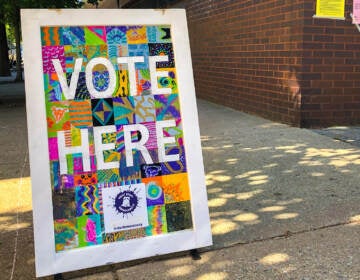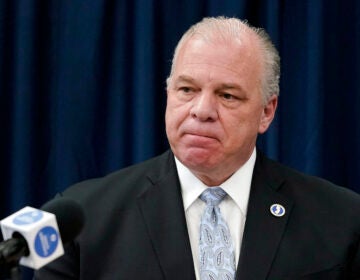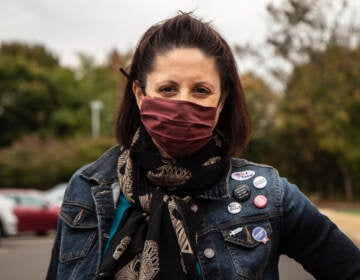It’s Election Day in Pa. and N.J. Here’s what’s at stake
It’s Election Day in Pennsylvania and New Jersey and both states will elect new public officials to several statewide offices.
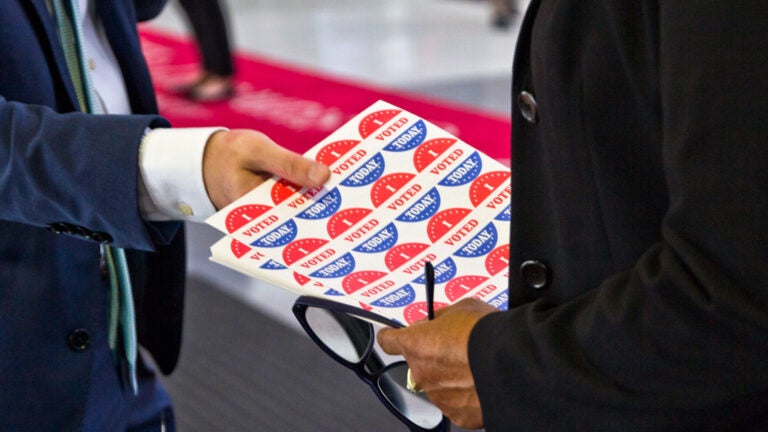
An election worker hands a sheet of "I Voted Today" stickers to a voter in Philadelphia. (Kimberly Paynter/WHYY)
It’s Election Day in Pennsylvania and New Jersey and both states will elect new public officials to several statewide offices.
New Jersey voters will pick their next governor — one of just two states that picks its governor the year after presidential elections (along with Virginia) — and Pennsylvania will elect four new judges to serve at least a decade on one of the commonwealth’s three appellate courts.
In-person voting opened at 7 a.m. in Pennsylvania and 6 a.m. in New Jersey and will close at 8 p.m. in both states. Both states also use mail ballots extensively, but be careful: If you haven’t mailed in your ballot yet, it’s too late to be sure it’ll get submitted in time. Luckily, both states allow voters to drop ballots off at drop boxes, or at their county elections offices. Voters can find New Jersey ballot dropoff locations online, as well as Pennsylvania ballot dropoff locations.
What’s at stake in New Jersey
New Jersey voters will decide whether Gov. Phil Murphy will make history and become the first Democratic governor to win reelection in 44 years — or whether to elect his Republican challenger, former state Assemblyman Jack Ciattarelli, who represented the 16th Legislative District from 2011 to 2018.
New Jersey is one of only two states that holds gubernatorial races in off years, and the latest Monmouth University poll shows Murphy leads Ciattarelli by a margin of 50% to 39% registered voters.
In addition to the governor’s race, all 120 seats in the state Legislature are up for election.
There are also two statewide ballot questions: one on whether to expand sports betting to include wagers on New Jersey colleges and universities, and another on whether to let nonprofits fundraise using proceeds from games of chance like bingo or raffles (only veterans and senior citizens groups are allowed to benefit from gaming proceeds).
As of Monday, more than 700,000 voters had already cast ballots, more than 200,000 of them during the state’s first-ever early in-person voting period, according to an analysis from the Rebovich Institute for New Jersey Politics at Rider University.
The same analysis reports that nearly 500,000 mail-in ballots have been returned. Early in-person ballots and mail-in ballots cast by registered Democratic voters outpace those returned by registered Republican voters by a sizable margin, according to the institute.
County election officials are allowed to begin canvassing mail-in ballots beginning just after midnight Tuesday, although results cannot be released until after 8 p.m. Early in-person votes cannot be canvassed prior to 8 p.m.
What’s at stake in Pennsylvania
As in the 2020 election, it’s possible the commonwealth won’t have final election results on election night. Pennsylvania law doesn’t allow county election offices to begin processing mail ballots for counting before 7 a.m. on the day of the election.
Election workers have long complained that this dramatically slows the counting process, but state lawmakers have been unable to come up with consensus legislation to fix the problem.
Department of State Secretary Veronica Degraffenreid said in a statement Monday that more than a million voters had requested mail ballots, and that she expects “the overwhelming majority of all ballots will be counted within a few days after the election.”
Pennsylvania elects judges for its Supreme, Superior, and Commonwealth courts in partisan, statewide elections — a more overtly political process than many states have.
It means all the judicial candidates run under the umbrella of a party and must raise money to be competitive. In a twist from regular legislative races, the candidates themselves aren’t allowed to solicit donations directly, and can’t promise to rule a certain way on any specific issues.
This year, there is one open seat on the Supreme Court, one on the Superior, and two on the Commonwealth Court.
Superior Court Judge Maria McLaughlin, a Democrat, is competing with Republican Commonwealth Court Judge Kevin Brobson for the Supreme Court seat. The court is already dominated by a five-to-two Democratic majority, and at best, Republicans are hoping to hold that margin. The retiring judge, Chief Justice Thomas Saylor, is a Republican.
That hasn’t kept the race from getting intense, though. About a week before Election Day, the Pennsylvania Bar Association formally admonished Brobson for running a TV ad that criticized McLaughlin’s judicial record. The ad, which dropped Oct. 18, said among other things that McLaughlin “chose to void the guilty plea of a drunk driver who admitted to killing a pregnant woman and her unborn child.”
It was misleading, the Bar Association said. McLaughlin and another judge had simply said the driver’s defense lawyer had made a mess of his case, and he should be retried. She didn’t hand down any verdict. After the Bar Association told Brobson to pull the ad or clarify his statements, his campaign released a lightly edited one, noting that McLaughlin had joined an opinion authored by another judge.
At a Democratic endorsement event the day before the election, McLaughlin was still dismayed about the entire episode.
“When your opponent uses his own campaign money … for an attack ad, when it’s clearly a flagrant violation? I think that’s something I think Pennsylvanians need to look at,” she said. “That’s something I’ve never done.”
In the Superior Court race, Philadelphia Common Pleas Judge Timika Lane, a Democrat, is going up against Republican former Deputy Attorney General Megan Sullivan.
Democratic Allegheny County Common Pleas Court Judge David Spurgeon and fellow Democrat, Philadelphia Court of Common Pleas Judge Lori Dumas, are competing for the two Commonwealth Court seats against Republican Bradford Attorney Stacy Wallace and former state Senate GOP lawyer Drew Crompton, who is already on the bench after being appointed to fill a vacancy.
Currently, the Superior Court is evenly split between the parties, and the Commonwealth Court is dominated by Republicans.
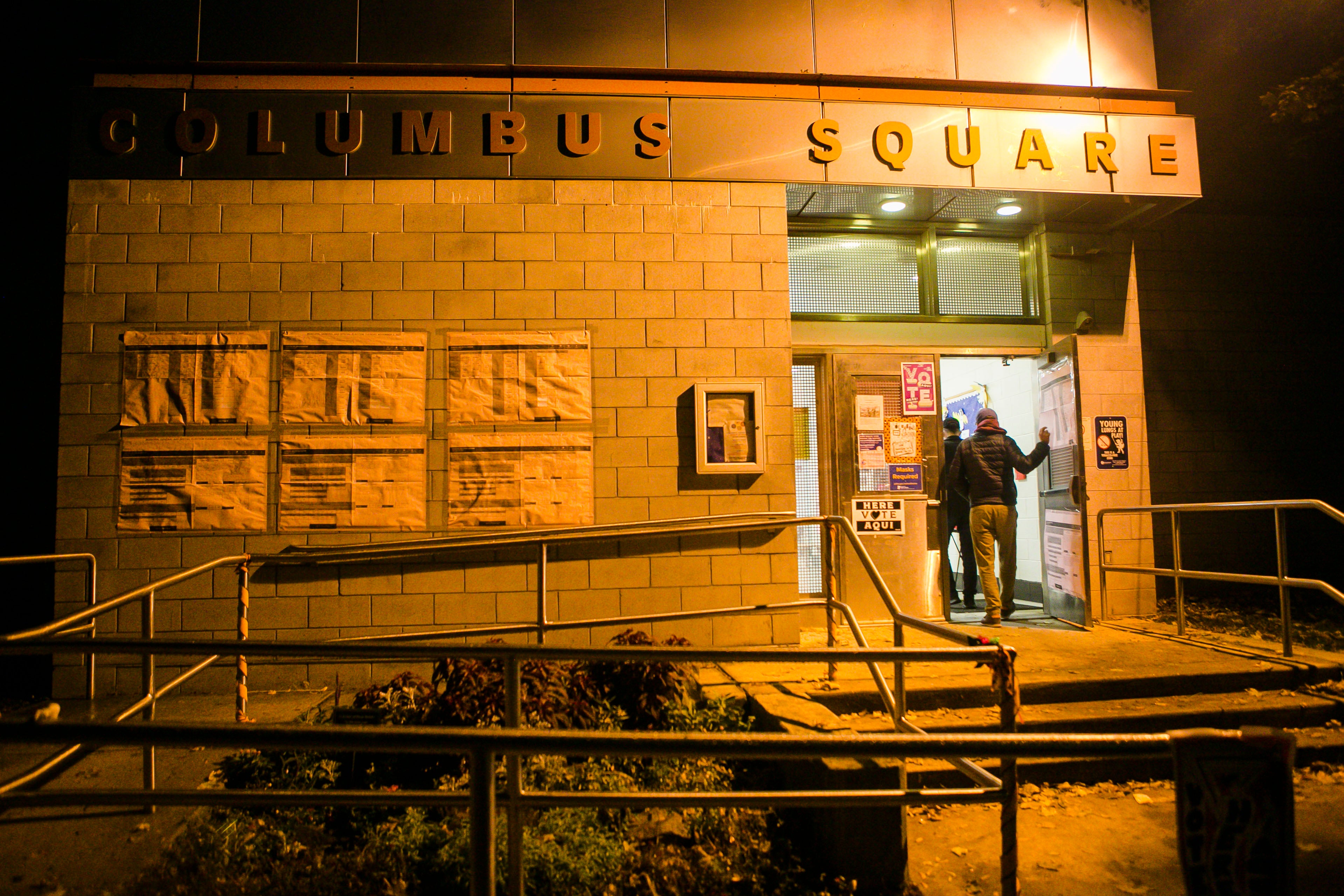
Voters in Philadelphia also have a contested race for District Attorney, though thanks to the city’s massive Democratic majority, it isn’t expected to be particularly competitive. Progressive District Attorney Larry Krasner is favored to win a second term after a decisive primary victory. His challenger is Republican defense attorney Chuck Peruto.

Get daily updates from WHYY News!
WHYY is your source for fact-based, in-depth journalism and information. As a nonprofit organization, we rely on financial support from readers like you. Please give today.



